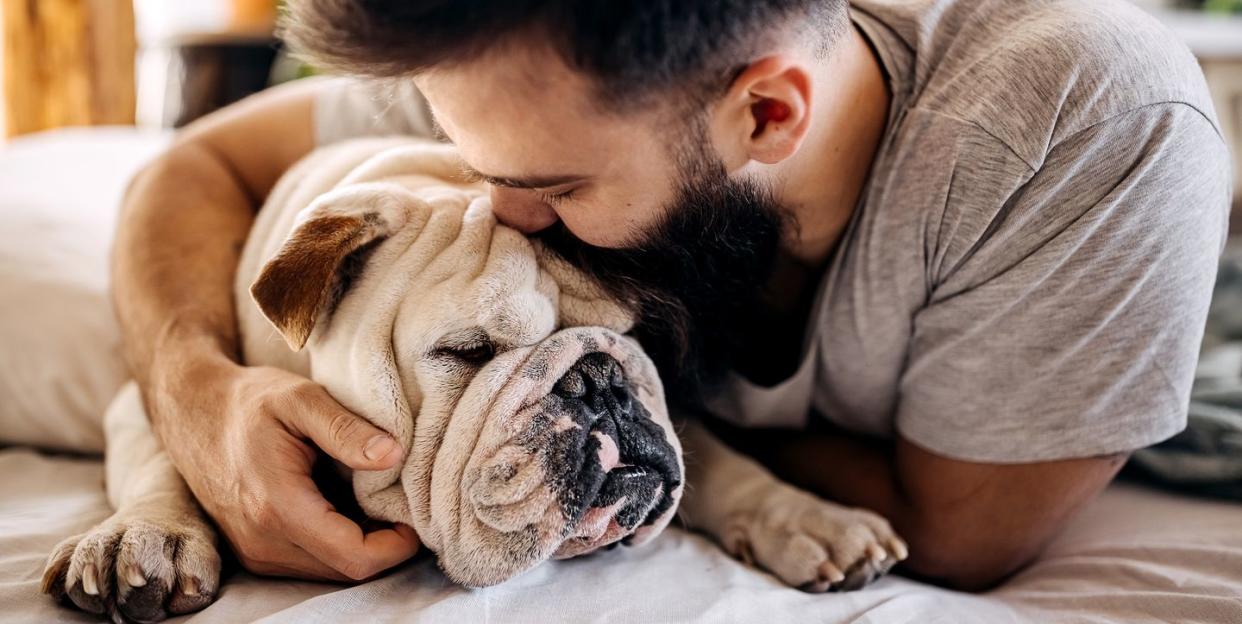The Loss of a Pet Can Be Heartbreaking — Here's How to Help Someone Going Through It

About 70% of U.S. households own a pet, according to the 2021-2022 National Pet Owners Survey conducted by the American Pet Products Association (APPA). So, many of us have experienced firsthand the unconditional love and joyful companionship that they can bring to our homes and families. While we also know that even the healthiest and happiest of pets can live relatively short lives, we still hope to have them with us for as long as possible.
The loss of a pet is an experience that can touch us profoundly. Unfortunately, it's not always regarded with the seriousness that losing a family member or friend evokes in others. It's important to know how to support someone who's lost a pet, because giving condolences to the bereaved helps them navigate the path of healing.
There are many ways to help a loved one honor their pet's memory and make them feel less alone during a hard time. Here's what the experts say about how to support someone who's lost a pet.
What do you say to someone who's lost a pet?
“There is no curative thing you can say that will ease the pain, at least in the short term, and grief is not a ‘one size fits all’ process,” stresses Dr. Marie-Charlotte Popp, DVM of Kirkwood Animal Hospital. “I acknowledge the emotions around their grief and tailor my response to what the person in front of me is emotionally ready to receive, letting them know that I am here for them and making it clear that whatever emotions they are feeling are valid,” adds Popp.
She also stresses that knowing what not to say is just as important. We’ve all heard variations of “It’s just a *insert animal*,” “It’s okay, you can get another one,” “She’s in a better place,” or “He was old or sick anyway.”
“These can be well-meaning clichés, but they invalidate the inherent emotional value of the pet and overlook the loss as a valued and beloved family member,” says Popp.
Certified service dog trainer and founder of Mindful Doggo, Jackie Carleen, suggests sending the bereaved a handwritten sympathy card. She suggests reaching out with something similar to the following message: “Amy, I was saddened to learn of Bailey’s death. He had a wonderful way of sparking joy with his mere presence. May I help by running errands or bringing dinner over? I want to support you any way possible during this difficult time.”
And then follow-up! “When you talk with the bereaved, treat the loss of a pet like that of a human family member. You don't need to say anything eloquent, just a simple 'thinking of you during this time' or ‘I want you to know how much I love and care about you and your pet,’ suffices,” says Carleen.
What are some ways to help alleviate their grief?
Dr. Bethany Hsia, DVM and cofounder of CodaPet, suggests the following tactics that can help pet parents ease their grief after losing a pet:
Encourage them to reminisce about their pet and share stories or photos.
Remind them to take care of themselves physically, emotionally, and mentally.
Offer information about pet loss support groups, counseling services, or online communities where they can connect with others who have experienced similar losses.
Additionally, while you want to make sure you focus on the griever's feelings, if you've experienced a pet's loss or the hardship of caring for a sick pet, your perspective can be valuable to someone with newer grief.
“Sometimes, when a pet has been struggling with a lengthy illness, I warn people that they may feel a sense of relief, because they know their pet is no longer struggling,” says Dr. Karyn Kanowski, chief veterinary surgeon at Redruth Veterinary Surgery and consultant for Hepper.com. “I tell them this, because it’s important that they not feel guilty.”
You can also invite them to do activities that can provide a happy distraction, such as exercise or spending time outdoors. However, if their grief is completely overshadowing everything else in their life, you may want to suggest additional support.
“If they are struggling to cope with the loss, encourage them to seek help from a licensed professional counselor who can help them navigate their grief journey more effectively,” says Ian Jackson, therapist and clinical director at Recovery Unplugged.
How can you help honor their pet's memory?
Honoring a pet after they've died can bring comfort and a sense of closure. Some ways to do this include creating a memorial, such as planting flowers or a tree in their memory or making an art piece.
“Help them to create a photo album or frame photos of their pet around the house,” says Jackson. “You could also suggest volunteering at an animal shelter or perhaps rescuing another pet in honor of their passed pet (when they’re ready).”
Another one of the best ways to help someone through a period of mourning is to talk about their pet and celebrate their life in small but meaningful ways.
“Sit with them, invite them to talk about their cherished pet — especially the funny stories, the quirks, and the flaws,” says Popp. She also suggests taking a trip to their pet’s favorite park, donating to a shelter, or getting a clay paw-print keepsake.
Over time, these conversations and actions may taper off as the bereaved gradually adapts to life without their beloved pet — but just know that healing doesn't mean forgetting; it means finding a new way to carry the love of a pet forward.
“Whether it was a reptile, fish, small mammal, dog, cat, horse, or bird, their animal was a source of constant companionship, comfort, joy, and unconditional love,” says Popp. “And for some people, their pet represented one of or possibly the only source for these. Let them know that you see and understand that,” she says.
You Might Also Like

